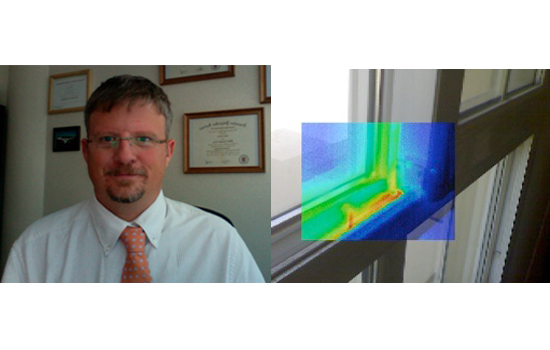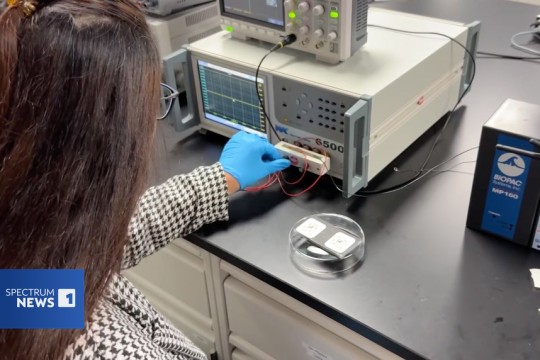Residential Energy Efficiency Studied at RIT Dubai
Online resource to be created in project funded by Emirates Foundation for Philanthropy
Alex Friess, an associate professor of mechanical engineering at RIT Dubai, is leading a research project exploring ways to make residential homes more energy efficient. The project recently received $27,000 from the Emirates Foundation for Philanthropy. The image at right shows an infrared photograph of hot, outside air infiltrating a window frame.
A Rochester Institute of Technology researcher at RIT Dubai, in the United Arab Emirates, is exploring ways to make residential homes there—and in hot climates anywhere—more energy efficient.
Alex Friess, an associate professor of mechanical engineering, is leading the project, which was recently awarded $27,000 from the Emirates Foundation for Philanthropy.
Although energy resources—notably crude oil—aren’t particularly scarce in the Middle East relative to other parts of the planet, concerns about global climate change and finite fossil-fuel resources worldwide boost the incentive to conserve energy, Friess says.
The United Arab Emirates has one of the highest per capita energy consumption and carbon-dioxide emission rates, he says—adding to the urgency for renewable energy sources and, equally important, energy conservation in a climate requiring significant cooling much of the year.
The RIT Dubai Residential Energy Assessment Centre will conduct local field studies of residential villas and explore energy-saving alternatives in both the design and “post-occupancy” stages. Researchers will measure the effects of factors such as shading options, insulation, roof treatments, windows and ventilation. Findings, to be reported publicly online, will be a resource for architects, engineers, scientists, homeowners and others.
“While the generation of clean energy represents the most visible avenue to decrease the UAE’s high per-capita CO2 production, the potential and practice of improving energy efficiency often takes the second stage—driven primarily by aesthetics,” Friess says.
“This project will help quantify potential energy savings in residences and provide a platform for continuing studies and to promote energy efficiency practices to the general public.”
Friess received the award as part of an Emirates Foundation for Philanthropy competition promoting energy efficiency in the United Arab Emirates and supported by ExxonMobil and Abu Dhabi Gas Industries.
“Energy efficiency is one of the largest and lowest-cost ways to extend energy supplies and reduce greenhouse gas emissions,” says Morten Mauritzen, president of ExxonMobil Affiliates in Abu Dhabi. The firm provided $1 million to the project as part of a $5 million commitment to the Emirates Foundation.
RIT Dubai’s Sustainable Energy and Energy Efficiency Group, led by Friess, is also studying the performance of a variety of “e-mobility” (electric vehicle) solutions in the United Arab Emirates (from sustainability, technological and economic standpoints) and the deployment of sustainable energy technology in extreme climates.
About RIT Dubai: RIT Dubai was established in 2008 to provide world-class educational university programs in the United Arab Emirates for students and professionals from the Middle East, North Africa and Southeast Asia. RIT Dubai offers the same accredited degrees that are offered by Rochester Institute of Technology, the 15th largest private university in the United States. For more information, go to the RIT Dubai website.
About Alex Friess: Originally from Germany, Alex Friess earned a B.S. in physics and a M.S. and Ph.D. in aeronautical engineering from Rensselaer Polytechnic Institute. His research background includes experimental fluid dynamics and instrumentation, composite materials and lightweight structures, and optimization with a focus on high-performance sports. As a consultant and design engineer, he participated in the design and engineering of South Africa’s yacht for the America’s Cup 2007. He has held executive leadership positions in the renewable energy industry in Spain and academic appointments at Dubai Aerospace Enterprise University. At RIT Dubai since 2009, his current research focuses on renewable-energy applications, engineering design and design education, with emphasis on multinational student collaboration and educating the “global engineer.”













